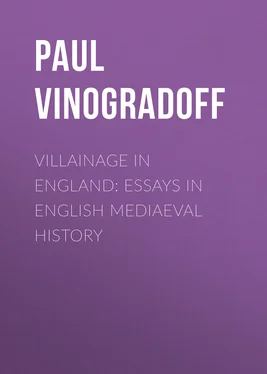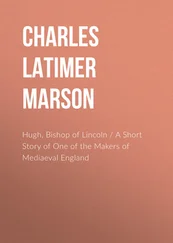Paul Vinogradoff - Villainage in England - Essays in English Mediaeval History
Здесь есть возможность читать онлайн «Paul Vinogradoff - Villainage in England - Essays in English Mediaeval History» — ознакомительный отрывок электронной книги совершенно бесплатно, а после прочтения отрывка купить полную версию. В некоторых случаях можно слушать аудио, скачать через торрент в формате fb2 и присутствует краткое содержание. Жанр: foreign_prose, Юриспруденция, История, foreign_edu, foreign_antique, на английском языке. Описание произведения, (предисловие) а так же отзывы посетителей доступны на портале библиотеки ЛибКат.
- Название:Villainage in England: Essays in English Mediaeval History
- Автор:
- Жанр:
- Год:неизвестен
- ISBN:нет данных
- Рейтинг книги:4 / 5. Голосов: 1
-
Избранное:Добавить в избранное
- Отзывы:
-
Ваша оценка:
- 80
- 1
- 2
- 3
- 4
- 5
Villainage in England: Essays in English Mediaeval History: краткое содержание, описание и аннотация
Предлагаем к чтению аннотацию, описание, краткое содержание или предисловие (зависит от того, что написал сам автор книги «Villainage in England: Essays in English Mediaeval History»). Если вы не нашли необходимую информацию о книге — напишите в комментариях, мы постараемся отыскать её.
Villainage in England: Essays in English Mediaeval History — читать онлайн ознакомительный отрывок
Ниже представлен текст книги, разбитый по страницам. Система сохранения места последней прочитанной страницы, позволяет с удобством читать онлайн бесплатно книгу «Villainage in England: Essays in English Mediaeval History», без необходимости каждый раз заново искать на чём Вы остановились. Поставьте закладку, и сможете в любой момент перейти на страницу, на которой закончили чтение.
Интервал:
Закладка:
CHAPTER III.
ANCIENT DEMESNE
Definition.
The old law books mention one kind of villainage which stands out in marked contrast with the other species of servile tenure. The peasants belonging to manors which were vested in the crown at the time of the Conquest follow a law of their own. Barring certain exceptions, of which more will be said presently, they enjoy a certainty of condition protected by law. They are personally free, and although holding in villainage, nobody has the right to deprive them of their lands, or to alter the condition of the tenure, by increasing or changing the services. Bracton calls their condition one of privileged villainage, because their services are base but certain, and because they are protected not by the usual remedies supplied at common law to free tenants, but by peculiar writs which enforce the custom of the manor 137 137 Bracton, 209; cf. 7 and 200. Britton, ii. 13.
. It seems well worth the while to carefully investigate this curious case with a view to get at the reasons of a notable deviation from the general course, for such investigation may throw some reflected light on the treatment of villainage in the common law.
Legal practice is very explicit as to the limitation of ancient demesne in time and space. It is composed of the manors which belonged to the crown at the time of the Conquest 138 138 Bracton, 209: 'Villenagium privilegiatum … tenetur de Rege a Conquestu Angliae.' Cf. Blackstone, Law Tracts, ii. 128.
. This includes manors which had been given away subsequently, and excludes such as had lapsed to the king after the Conquest by escheat or forfeiture 139 139 Madox, History of the Exchequer, i. 704: 'Tallagium dominiorum et escaetarum et custodiarum.'
. Possessions granted away by Saxon kings before the Conquest are equally excluded 140 140 Bract. Note-book, 1237 (the prior of St. Swithin denies a manor to be ancient demesne): '… per cc annos ante conquestum Anglie [terre] date fuerunt priori et conventui et ab aliis quam regibus.'
. In order to ascertain what these manors were the courts reverted to the Domesday description of Terra Regis . As a rule these lands were entered as crown lands, T.R.E. and T.R.W., that is, were considered to have been in the hand of King Edward in 1066, and in the hand of King William in 1086. But strictly and legally they were crown lands at the moment when King William's claim inured, or to use the contemporary phrase, 'on the day when King Edward was alive and dead.' The important point evidently was that the Norman king's right in this case bridged over the Conquest, and for this reason such possessions are often simply said to have been royal demesne in the time of Edward the Confessor. This legal view is well illustrated by a decision of the King's Council, quoted by Belknap, Chief Justice of the Common Pleas, in 1375. It was held that the manor of Tottenham, although granted by William the Conqueror to the Earl of Chester before the compilation of Domesday, was ancient demesne, as having been in the hands both of St. Edward and of the Conqueror 141 141 Y.B. Trin. 49 Edw. III, pl. 8 (Fitzherbert, Abr. Monstraver. 4): '… touts les demesnes qui fuerent en la maine Seint E. sont aunciens demesne, mesque ils fuerent aliens a estraunge mains quant le liver de Domesday se fist, come il avient del manor de Totenham qui fut en autre maine a temps de Domesday fait, come en le dit livers fait mencion, que il fuit adonques al Counte de Cestre.'
. And so 1066 and not 1086 is the decisive year for the legal formation of this class of manors 142 142 Very curious pleadings occurred in 1323. Y.B. 15 Edw. II, p. 455: ' Ber(wick) Ils dient en l'Exchequer que serra ( corr. terra) R. serra ecrit sur le margin en cas ou cest ancien demene en Domesday, mes ceo fust escript sur le dyme foille apres sur un title terra R., mesine ( corr. mes une or mesqe?) R. fuit escript sur le margin de chescun foille apres, e tout ceo la est anciene demene a ceo quil nient ( corr. dient), mes ascunes gens entendent que les terres qui furent les demenes le Roy St. Edward sont auncien demene, e autres dient fors les terres que le Conquerour conquist, que furent en la seissin St. Edward le jour quil mourust sont anciene demene.' Although a difference of opinion is mentioned it is not material, for this reason, that the entry as Terra Regis , at least T.R.E., is absolutely required to prove a manor ancient demesne. I give the entry on the Plea Roll in App. V.
.
Tenure in ancient demesne a kind of villainage.
In many respects the position of the peasantry in ancient demesne is nearly allied to that of men holding in villainage at common law. They perform all kinds of agricultural services and are subject to duties quite analogous to those which prevail in other places; we may find on these ancient manors almost all the incidents of servile custom. Sometimes very harsh forms of distress are used against the tenants 143 143 I think only distress can be implied by the remark of Bereford J. Y.B. 30/31 Edw. I, p. 19: 'Quant vous vendrez a loustel, fetes de vostre archevileyn ceo qe vous vodrez.' The words are strange and possibly corrupt.
; forfeiture for non-performance of services and non-payments of rents was always impending, in marked contrast with the considerate treatment of free tenantry in such cases 144 144 Blackstone, Law Tracts, ii. 153: 'They cannot alienate tenements otherwise than by surrender into the lord's hand.' Bracton, 209.
. We often come across such base customs as the payment of merchet in connexion with the 'villain socmen' of ancient demesne 145 145 In a most curious description of the customs of villain sokemen of Stoneleigh, Warwick, in the Register of Stoneleigh Abbey, I find the following entries: 'Item sokemanni predicti filias suas non possunt maritare sine licencia domini prout patet anno viij Regis E. filii Regis E. per rotulum curie in quo continetur quod Matildis de Canle in plena curia fecit finem cum domino pro ij sol. quia maritauit filiam suam Thome de Horwelle sine licencia domini.... Item anno Regis H. lvj continetur in rotulo curie quod Willelmus Michel fuit in misericordia quia maritauit filiam suam sine licencia domini et similiter decenarii fuerunt in misericordia quia hoc concelauerunt.' As to the Stoneleigh Register, see App. VI. Another instance of merchet in an ancient demesne manor is afforded by the Ledecumbe (Letcombe) Regis Court Rolls of 1272. Chapter House, County Bags, Berks. No. 3, m. 12: 'Johannes le Jeune se redemit ad maritandum et fecit finem xij sol.... Johannes Atwel redemit filiam suam anno predicto' (Record Office).
. And such instances would afford ample proof of the fact that their status has branched off from the same stem as villainage, if such proof were otherwise needed.
Privileges of ancient demesne.
The side of privilege is not less conspicuous. The indications given by the law books must be largely supplemented from plea rolls and charters. The special favour shown to the population on soil of ancient demesne extends much further than a regulation of manorial duties would imply, it resolves itself to a large extent into an exemption from public burdens. The king's manor is treated as a franchise isolated from the surrounding hundred and shire, its tenants are not bound to attend the county court or the hundred moot 146 146 Henry II's charter to Stoneleigh Abbey: 'Quieta de schiris et hundredis, et murdro et danegeldo, et placitis et querelis, et geldis et auxiliis, et omni consuetudine et exactione' (Dugdale, Monasticon, v. 447).
, they are not assessed with the rest for danegeld or common amercements or the murder fine 147 147 Close Roll, 12 Henry III., m. 11, d: 'Monstrauerunt domino Regi homines de Esindene et de Beyford, quod occasione misericordiae c. librarum, in quam totus Comitatus Hertfordie incidit coram iusticiariis ultimo itinerantibus … hidagium quoddam assedit vicecomes super eos ad auxilium faciendum ceteris de comitatu ad misericordiam illam acquietandam et inde eos distringit. Quia vero predicti homines nec alii de dominicis domini Regis sectam faciunt ad comitatum et ea racione non tenentur ad misericordiam ceterorum de comitatu illo acquietandam auxilium facere aut inde participes esse, mandatum est vicecomiti Hertfordie quod homines predictos in hidagio et demanda pacem habere permittat' (Record Office). Placita de Quo Warranto, 777, 778: 'Non quieti de communi amerciamento nisi tantum in Stonle.'
, they are exempted from the jurisdiction of the sheriff 148 148 Viner, Abr. v. Anc. Dem. C 2 , 1; cf. E, 20. Madox, Hist. of Exch., i. 418, note l : 'Quieti de auxilio vicecomitis et baillivorum suorum.'
, and do not serve on juries and assizes before the king's justices 149 149 Cor. Rege, Mich. 5 E. II, m. 77: '(Juratores dicunt quod homines de Wycle) in itinere respondent per quatuor et prepositum sicut cetere ville de corpore comitatus.' This against their claim to hold in ancient demesne.
; they are free from toll in all markets and custom-houses 150 150 Viner, Abr. Anc. Dem. B. 1, 4, 6.
. Last, but not least, they do not get taxed with the country at large, and for this reason they have originally no representatives in parliament when parliament forms itself. On the other hand, they are liable to be tallaged by the king without consent of parliament, by virtue of his private right as opposed to his political right 151 151 Madox, Exch., i. 412, 698.
. This last privilege gave rise to a very abnormal state of things, when ancient demesne land had passed from the crown to a subject. The rule was, that the new lord could not tallage his tenants unless in consequence of a royal writ, and then only at the same time and in the same proportion as the king tallaged the demesnes remaining in his hand 152 152 Stubbs, ii. 566, 567 (Libr. ed.); Madox, Exch., i. 751.
. This was an important limitation of the lord's power, and a consequence of the wish to guard against encroachments and arbitrary acts. But it was at the same time a curious perversion of sovereignty:—the person living on land of this description could not be taxed with the county 153 153 Cor. R. M. 5 E. II, m. 77: 'Quando communitas comitatus talliatur … predicti homines taxantur sicut ceteri villani ejusdem comitatus' (against the ancient demesne claim).
, and if he was taxed with the demesnes, his lord received the tax, and not the sovereign. I need not say that all this got righted in time, but the anomalous condition described did exist originally. There are traces of a different view by which the power of imposing tallage would have been vested exclusively in the king, even when the manor to be taxed was one that had passed out of his hand 154 154 Fitzherbert, Abr. Monstauerunt, 6 (H. 32 E. III): '… quant le roi taile les burghs a taunt come ils paia a taile pur tant il nous distreint.' Th. : 'Entend qe les feoffes le roy auront taile?' quasi diceret non, 'car cest un regalte qui proprement attient al roy et a nul auter.' Clam. : 'Tout aura il tail il serra leue en due maner sil auront breve hors del chauncerie al viconte, sc. quod habere facias racionable taile.' The men of King's Ripton, Hunts., who were constantly wrangling about their rights with the Abbot of Ramsey, the lord of the manor, maintained that they had never been tallaged nisi tantummodo ad opus Regis, and their claim was corroborated by an inspection of the Exchequer Rolls (Madox, Exch., i. 757, n). Before granting a writ of tallage to the Abbot of Stoneleigh in 1253, Henry III had an inquisition made as to the precedents. It was found that 'Nunquam predictum manerium de Stonle talliatum fuit postquam Johannes Rex predictum manerium dedit predicti Abbati et Conventui' (Stoneleigh Reg., f. 25).
. But the general rule up to the fourteenth century was undoubtedly to relinquish the proceeds to the holder of the manor. Such treatment is eminently characteristic of the conception which lies at the bottom of the whole institution of ancient demesne. It is undoubtedly based on the private privilege of royalty. All the numerous exceptions and exemptions from public liabilities and duties flow from one source: the king does not want his land and his men to be subjected to any vexatious burdens which would lessen their power of yielding income 155 155 The Law-books say so distinctly. Britton, ii. 13: 'Et pur ceo qe teus sokemans sount nos gaynours de nos terres, ne voloms mie qe teles gentz seint a nule part somouns de travailer en jurez ne en enquestes, for qe en maners a queus il appendent.' Cf. Fleta, p. 4.
. Once fenced in by royal privilege, the ancient demesne manor keeps up its private immunity, even though it ceases to be royal. And this is the second fact, with which one has to reckon. If the privileged villainage of ancient demesne is founded on the same causes as villainage pure and simple, the distinguishing element of 'privilege' is supplied to it by the private interest of the king. This seems obvious enough, but it must be insisted upon, because it guards against any construction which would pick out one particular set of rights, or one particular kind of relations as characteristic of the institution. Legal practice and later theory concerned themselves mostly with peculiarities of procedure, and with the eventuality of a subject owning the manor. But the peculiar modes of litigation appropriate to the ancient demesne must not be disconnected from other immunities, and the ownership of a private lord is to be considered only as engrafted on the original right of the king. With this preliminary caution, we may proceed to an examination of those features which are undoubtedly entitled to attract most attention, namely, the special procedure which is put in action when questions arise in any way connected with the soil of ancient demesne.
Интервал:
Закладка:
Похожие книги на «Villainage in England: Essays in English Mediaeval History»
Представляем Вашему вниманию похожие книги на «Villainage in England: Essays in English Mediaeval History» списком для выбора. Мы отобрали схожую по названию и смыслу литературу в надежде предоставить читателям больше вариантов отыскать новые, интересные, ещё непрочитанные произведения.
Обсуждение, отзывы о книге «Villainage in England: Essays in English Mediaeval History» и просто собственные мнения читателей. Оставьте ваши комментарии, напишите, что Вы думаете о произведении, его смысле или главных героях. Укажите что конкретно понравилось, а что нет, и почему Вы так считаете.












